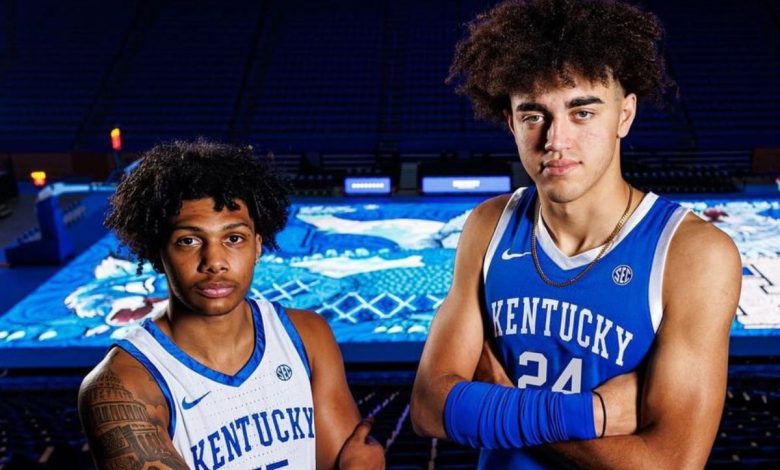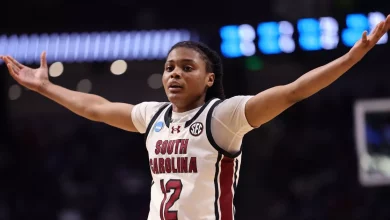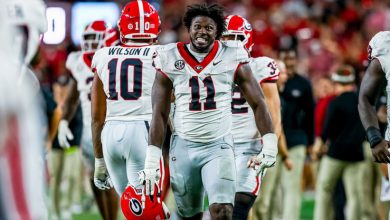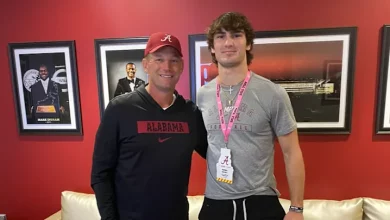4-star PG Acaden Lewis decommits from Kentucky, marking a significant shift for the Wildcats’ 2025 recruiting class.

In a move that has sent shockwaves through the Kentucky basketball community, 4-star point guard Acaden Lewis has decommitted from the Wildcats. The highly touted recruit, who had been considered one of the crown jewels of Kentucky’s 2025 recruiting class, is now reevaluating his college options. This development marks a significant shift in the Wildcats’ recruiting strategy and poses several questions about the future of the program.
Lewis, a top-30 prospect nationally and one of the most dynamic point guards in the 2025 class, was initially expected to play a major role in Kentucky’s backcourt for the coming seasons. His decision to decommit, coming at a time when recruiting momentum was building for the Wildcats, leaves a void that Coach John Calipari and his staff will now have to address.
In this article, we will examine the impact of Acaden Lewis’ decommitment on Kentucky’s 2025 recruiting class, explore possible reasons behind his decision, and discuss the broader implications for Kentucky basketball as a whole.
The Rise of Acaden Lewis
Acaden Lewis is a name that has been at the forefront of recruiting circles for several years. Known for his dynamic playmaking ability, quick first step, and defensive tenacity, Lewis quickly rose to prominence as one of the best point guards in the 2025 class. Standing at 6’4”, he possesses a rare blend of size, skill, and basketball IQ that made him an attractive target for some of the nation’s top programs.
Lewis originally committed to Kentucky during his junior year of high school, and the Wildcats appeared to have secured a critical piece for their future. He had visited Lexington multiple times and seemed to be a perfect fit for Coach Calipari’s system, which has traditionally relied on high-level point guards to orchestrate the offense and defend at a high level.
During his high school career, Lewis showcased an impressive ability to lead his team, demonstrating an advanced understanding of the game. His ball-handling and vision as a playmaker were second to none, and he also impressed scouts with his ability to create for others, something that is essential for any point guard running an offense at the college level.
However, with his decommitment, the Wildcats now find themselves in a precarious position. Losing a player of Lewis’ caliber—especially one who was seen as the cornerstone of the 2025 recruiting class—raises concerns about Kentucky’s ability to maintain its recruiting momentum heading into the next recruiting cycle.
The Timing of the Decommitment
The timing of Acaden Lewis’ decommitment is notable for several reasons. First, Lewis had committed to Kentucky relatively early in his recruiting process. As a result, he had been a central figure in the Wildcats’ recruiting efforts for the 2025 class. His decommitment comes at a time when the Wildcats were looking to build on a strong recruiting foundation, and this shift could have a ripple effect on their ability to secure other top-tier prospects.
It’s important to note that decommitments are not uncommon in college basketball recruiting, particularly as the landscape of recruitment evolves. With the rise of the transfer portal, NIL (Name, Image, and Likeness) opportunities, and the changing dynamics of the sport, high school athletes are more likely than ever to reconsider their decisions and explore other options.
In Lewis’ case, his decommitment could be influenced by a variety of factors, including the aforementioned elements. The transfer portal has increased competition for playing time, and with Kentucky’s high-profile recruiting classes year after year, Lewis may have been uncertain about his immediate role with the Wildcats. Additionally, NIL opportunities have become a major factor in recruitment, and the allure of programs with strong NIL programs might have played a role in his decision.
Potential Reasons Behind the Decommitment
While the exact reasons behind Acaden Lewis’ decommitment remain unclear, there are several factors that could have influenced his decision.
1. The Transfer Portal and Roster Uncertainty
One of the primary challenges facing high school recruits today is the uncertainty created by the transfer portal. With college basketball rosters constantly in flux, recruits like Lewis may have been uncertain about their roles within a program. The influx of transfer portal players means that players in the class of 2025 may find themselves competing for spots with more experienced players who are looking for a fresh start.
For Lewis, this uncertainty may have caused him to reconsider his commitment to Kentucky. Coach John Calipari has a history of bringing in top-tier transfers, and with a highly competitive program like Kentucky, it’s possible that Lewis was unsure of how his role would shake out amidst the influx of older, more experienced players.
2. NIL Opportunities and Changing Priorities
The landscape of college basketball has changed dramatically in recent years with the introduction of NIL rights. With athletes now able to profit off their name, image, and likeness, recruits have more opportunities than ever to capitalize on their talents and brand. It’s possible that Lewis, like many of his peers, has started to weigh the NIL opportunities available at other programs as a factor in his decision-making process.
Kentucky, known for its historic basketball program, has been slow to adapt to the NIL era compared to some of its competitors. Schools with stronger NIL infrastructure might have been more attractive to Lewis, especially considering his status as a high-profile recruit.
3. Family and Personal Considerations
In some cases, decommitments are driven by personal or familial factors that are outside the scope of the basketball program itself. Lewis, like many high-profile recruits, may have received input from family members or mentors that influenced his decision to open up his recruitment again. The pressures of being a high-profile recruit can also weigh heavily on a young athlete, leading them to reconsider their choices based on what feels right for their personal growth and future.
4. Program Fit and Coaching Changes
Another factor that could have influenced Lewis’ decommitment is the fit between his playing style and the coaching staff’s vision. While Coach John Calipari has a long-standing reputation for developing elite talent, every player has a different set of expectations when it comes to how they envision their role on a team. If Lewis felt that Kentucky’s system or approach didn’t align with his playing style or long-term goals, he may have felt that it was time to re-evaluate his options.
What Does This Mean for Kentucky’s 2025 Recruiting Class?
Losing a player like Acaden Lewis is undoubtedly a blow to Kentucky’s recruiting efforts for the 2025 class. With his decommitment, the Wildcats lose not only a top-tier point guard but also a leader who could have helped set the tone for the class moving forward. Lewis was expected to play a central role in Kentucky’s backcourt, and his absence leaves a significant void.
That said, Kentucky is not new to recruiting challenges. Coach Calipari has built a program that regularly attracts elite talent, and he has proven time and again that he can rebound from setbacks in recruiting. The Wildcats are likely to focus on adding another high-caliber point guard or securing a transfer who can fill the void left by Lewis.
Moreover, Kentucky has several highly rated recruits already committed to the 2025 class, including some elite forwards and wings. While losing a point guard of Lewis’ caliber is a setback, the Wildcats still have plenty of firepower in the pipeline. The Wildcats’ ability to reload quickly and secure talent at multiple positions will help ensure that they remain competitive in the ever-changing world of college basketball.
Broader Implications for Kentucky Basketball
While losing Lewis is a blow to the program, it is important to keep the broader picture in mind. Kentucky remains one of the most prestigious basketball programs in the country, and Coach Calipari’s ability to adapt to the changing landscape of recruiting should not be underestimated.
The emergence of the transfer portal and NIL is transforming college basketball recruiting, and while Kentucky may face growing pains in adapting to this new reality, it has a long track record of success. The Wildcats’ commitment to developing talent, creating professional opportunities, and maintaining one of the nation’s most storied programs will likely continue to attract top-tier prospects.
For Kentucky fans, the message is clear: while decommitments like the one from Acaden Lewis can be frustrating, the program is well-equipped to weather such storms and continue to build for the future. The Wildcats’ tradition of success, their access to top talent, and their resources will continue to make them a powerhouse in college basketball.
Conclusion: Looking Ahead to the 2025 Class
Acaden Lewis’ decommitment marks a significant turning point in Kentucky’s recruiting journey for the 2025 class. While it creates challenges, it also provides Coach Calipari and his staff an opportunity to pivot and potentially bring in other talented players who can contribute to the team’s success in the coming years.
The Wildcats remain one of the most respected programs in college basketball, and while this setback stings, it is far from the end of the story. Kentucky will likely rebound from this decommitment, and the 2025 class remains full of promise and potential.
As the recruiting cycle continues to evolve, Kentucky will have to adapt to the new dynamics of college basketball, but with their talent and recruiting prowess, there’s no doubt that they will continue to compete at the highest level.









